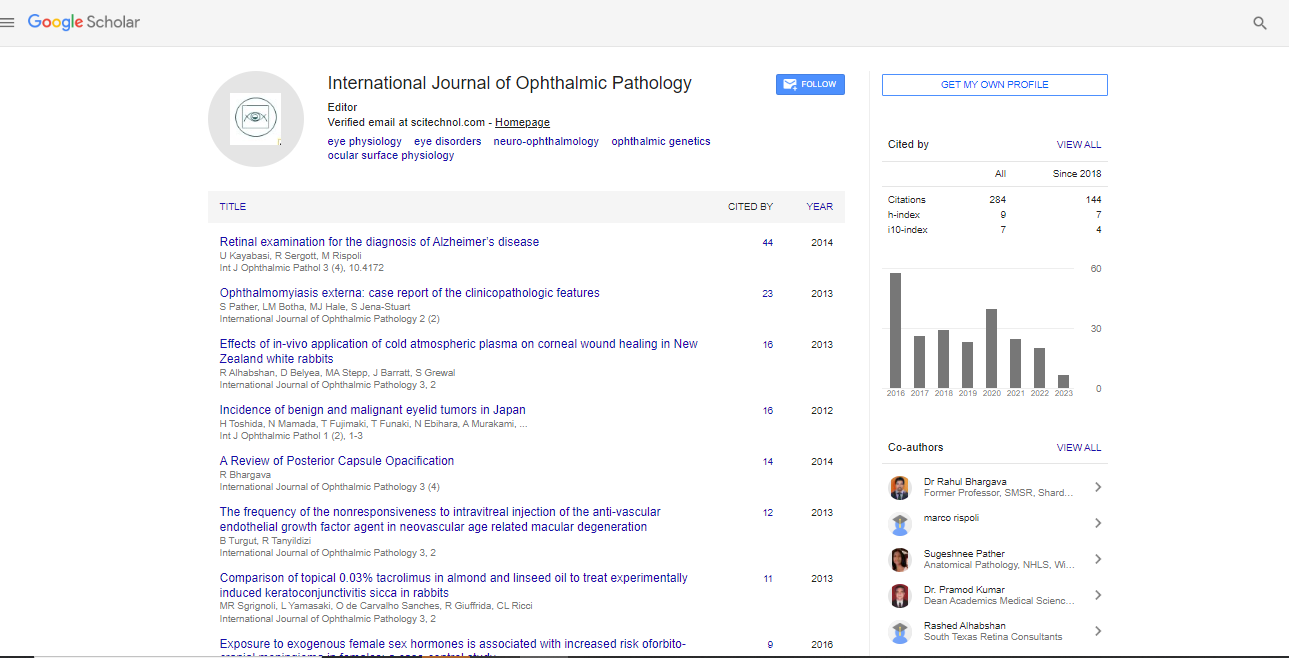Perspective, Int J Ophthalmic Pathol Vol: 12 Issue: 3
Treatment of Ocular Diseases with Immunology Advances
Pontelli Gouyer*
1Department of Ophthalmology, University of Sao Paulo, Sao Paulo, Brazil
*Corresponding Author: Pontelli Gouyer,
Department of Ophthalmology, University
of Sao Paulo, Sao Paulo, Brazil
E-mail: pontgou@usp.br
Received date: 20 June, 2023, Manuscript No. IOPJ-23-104139;
Editor assigned date: 23 June, 2023, PreQC No. IOPJ-23-104139 (PQ);
Reviewed date: 07 July, 2023, QC No. IOPJ-23-104139;
Revised date: 14 July, 2023, Manuscript No. IOPJ-23-104139 (R);
Published date: 21 July, 2023, DOI: 10.4172/2324-8599.12.3.028
Citation: Gouyer P (2023) Treatment of Ocular Diseases with Immunology Advances. Int J Ophthalmic Pathol 12:3.
Description
Ocular diseases encompass a wide range of conditions that affect the eye, leading to visual impairment and potential vision loss. In recent years, there have been significant advances in the field of immunology that have revolutionized the treatment approaches for various ocular diseases. Immunological interventions have emerged as powerful tools in managing these conditions by targeting the underlying immune responses and inflammatory processes that contribute to disease progression.
Many ocular diseases have an immunological component, where dysregulation of the immune system plays a vital role in disease development and progression. Conditions such as uveitis, autoimmune disorders affecting the eye, allergic conjunctivitis and corneal graft rejection involve immune-mediated processes. By deciphering the immunological mechanisms involved, analysts and clinicians have gained insights into potential therapeutic targets and strategies to modulate the immune response for improved treatment outcomes.
Uveitis, characterized by inflammation of the uvea (the middle layer of the eye), can lead to significant visual impairment if left untreated. Traditional treatments for uveitis include corticosteroids and immunosuppressive agents. However, the advent of immunomodulatory therapies has provided new treatment options. Biologic agents targeting specific molecules involved in the immune response, such as Tumor Necrosis Factor-alpha (TNF-alpha) Inhibitors and Interleukin-6 (IL-6) blockers, have shown promising results in reducing inflammation and improving visual outcomes for uveitis patients.
Autoimmune ocular diseases, such as autoimmune retinopathy and ocular cicatricial pemphigoid, pose significant challenges in diagnosis and management. These conditions involve aberrant immune responses that target ocular tissues, leading to tissue damage and vision loss. Recent advances in immunology have led to the development of novel therapeutic approaches, including immune checkpoint inhibitors and immune cell modulation, which aim to restore immune tolerance and prevent further tissue damage in autoimmune ocular diseases.
Allergic conjunctivitis is a common ocular condition characterized by inflammation of the conjunctiva, often triggered by allergens. Immunological advances have shed light on the underlying inflammatory pathways involved in allergic conjunctivitis, leading to the development of targeted therapies. These include antihistamines, mast cell stabilizers and specific immunotherapies aimed at desensitizing the immune response to allergens. Immunomodulatory approaches have shown efficacy in alleviating symptoms and reducing the burden of allergic conjunctivitis.
The cornea is the transparent front part of the eye and is susceptible to various immune-related disorders, such as corneal graft rejection and inflammatory corneal diseases. Immunomodulation plays a vital role in managing these conditions. Advances in immunology have paved the way for innovative therapies, including topical immunosuppressive agents, biologics targeting specific immune pathways and regenerative approaches using stem cells or tissue engineering to promote corneal healing and reduce the risk of graft rejection.
Immunogenetics is an evolving field that focuses on the genetic factors influencing immune responses and disease susceptibility. Understanding the genetic basis of ocular diseases has led to the concept of personalized medicine, where treatment strategies can be tailored based on an individual's genetic profile. Immunogenetic studies have identified specific gene variants associated with ocular diseases, providing insights into potential targets for immunomodulatory therapies and paving the way for personalized treatment approaches.
Conclusion
The field of immunology has witnessed remarkable progress in understanding the immunological basis of ocular diseases and developing targeted therapies. Immunomodulatory approaches have revolutionized the treatment landscape for ocular conditions, offering new possibilities for improved visual outcomes and enhanced patient care. By harnessing the power of immunology, clinicians and analysts are continually expanding their understanding of ocular diseases and working towards more effective and personalized treatment strategies. These developments have optimism in the treatment of ocular disease management, with the potential to transform the lives of countless individuals affected by these conditions.
 Spanish
Spanish  Chinese
Chinese  Russian
Russian  German
German  French
French  Japanese
Japanese  Portuguese
Portuguese  Hindi
Hindi 